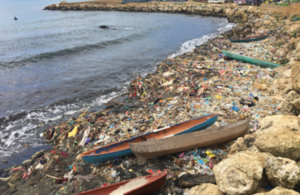UK marine scientists begin work to deliver marine litter action in South Pacific
Work on the Commonwealth Litter Programme has commenced in the South Pacific. Cefas scientists are working with local partners to take action on marine litter.

A beach covered in litter
Marine litter scientists from the UK kick-off work with partners in the South Pacific this week to tackle plastic pollution in the ocean.
Experts from the Centre for Environment, Fisheries and Aquaculture Science (Cefas), part of the UK government, are working alongside colleagues in Vanuatu and the Solomon Islands to identify country specific solutions to problems posed by marine litter, including reducing our reliance on single-use plastics, improvements in waste management, and developing more sustainable life cycles for plastics.
In recent years, the serious issue of marine litter and plastic pollution has been recognised by international governments and organisations, as well as local communities, as a growing threat to the marine environment and people’s livelihoods. It will form a key part of the UK and Vanuatu led Commonwealth Clean Oceans Alliance (CCOA) launched at the April Commonwealth Heads of Government Meeting (CHOGM) held in London. The alliance unites countries around the Commonwealth in their shared ambition to tackle plastics in the marine environment. To support this, the UK government are funding the Commonwealth Litter Programme (CLiP) to help share expertise and solutions.
The programme will bring together scientists, policy makers and communities around the world to identify actions which can be taken to stop plastic entering the marine environment, remove existing litter from the environment and raise awareness of what individuals and society can do to protect our marine habitats and wildlife.
Scientists from the UK are working with their colleagues across the Vanuatu and Solomon Islands governments, regional organisations, academia and community groups, to develop ideas and actions which support the existing efforts such as the ban on plastic bags, which will enable them to further achieve their ambitions on tackling plastic pollution. The programme will develop best practices and create a network of people, groups and communities across which these solutions and ideas can be shared.
UK Environment Minister Thérèse Coffey said:
It is fantastic to see world-leading UK scientists joining their Commonwealth counterparts and sharing expertise in the international fight to tackle the scourge of plastic in our oceans.
Plastic pollution is a global challenge, which requires global action. I’m proud to say the UK is at the forefront of this challenge and, through our Commonwealth Clean Oceans Alliance, we will use the collective power of the Commonwealth to protect our marine environment for future generations.
UK Foreign Office Minister of State for the Commonwealth Lord (Tariq) Ahmad of Wimbledon said:
Islands in the South Pacific know all too well the negative impacts of plastic pollution. By working together, particularly through the Commonwealth, we can make a difference, by better protecting our precious marine environments and the livelihoods they support. The Commonwealth brings together British and international experts to find solutions and I am pleased it is leading the way for the rest of the world with this marine litter programme.
Cefas’ principal marine litter scientist, Thomas Maes said,
Cefas is delighted to be collaborating with the government and other organisations in the South Pacific in finding solutions to the issues around marine litter. Cefas has international expertise and experience in marine litter science and policy which we are pleased to share with Vanuatu and the Solomon Islands, and further nations, to help address the problem.
The two Pacific island nations are the first to receive support through CLiP.
Hon. Ralph Regenvanu, the Vanuatu Minister of Foreign Affairs, said,
We are happy to support Cefas, through the Commonwealth Litter Programme, to work towards identifying national solutions to the issues of marine litter, so that we can protect Vanuatu’s precious natural resources now and for future generations.
Toney Tevi, Head of the Oceans Division under the Vanuatu Ministry of Foreign Affairs added,
We are pleased to work with the programme, which aligns with existing national policy to tackle plastic pollution, because it is focussed specifically on Vanuatu’s needs. I am personally thankful that this programme will also build capacity here for continued marine litter monitoring to take place, leaving a legacy ensuring that we continue to look after our natural environment.
Scientists will be in the region until the end of February, working with local colleagues and stakeholders to monitor litter, clean beaches and raise awareness of actions which can be taken.
A national policy workshop in January and a final conference in February for wider South Pacific stakeholders will summarise findings and share potential solutions for the region, also informing the roll out of the wider CLiP programme in other Commonwealth countries.
Beyond February, as the programme expands to other parts of the world, networks will be developed to ensure that any further ideas can be shared back to the South Pacific for consideration.